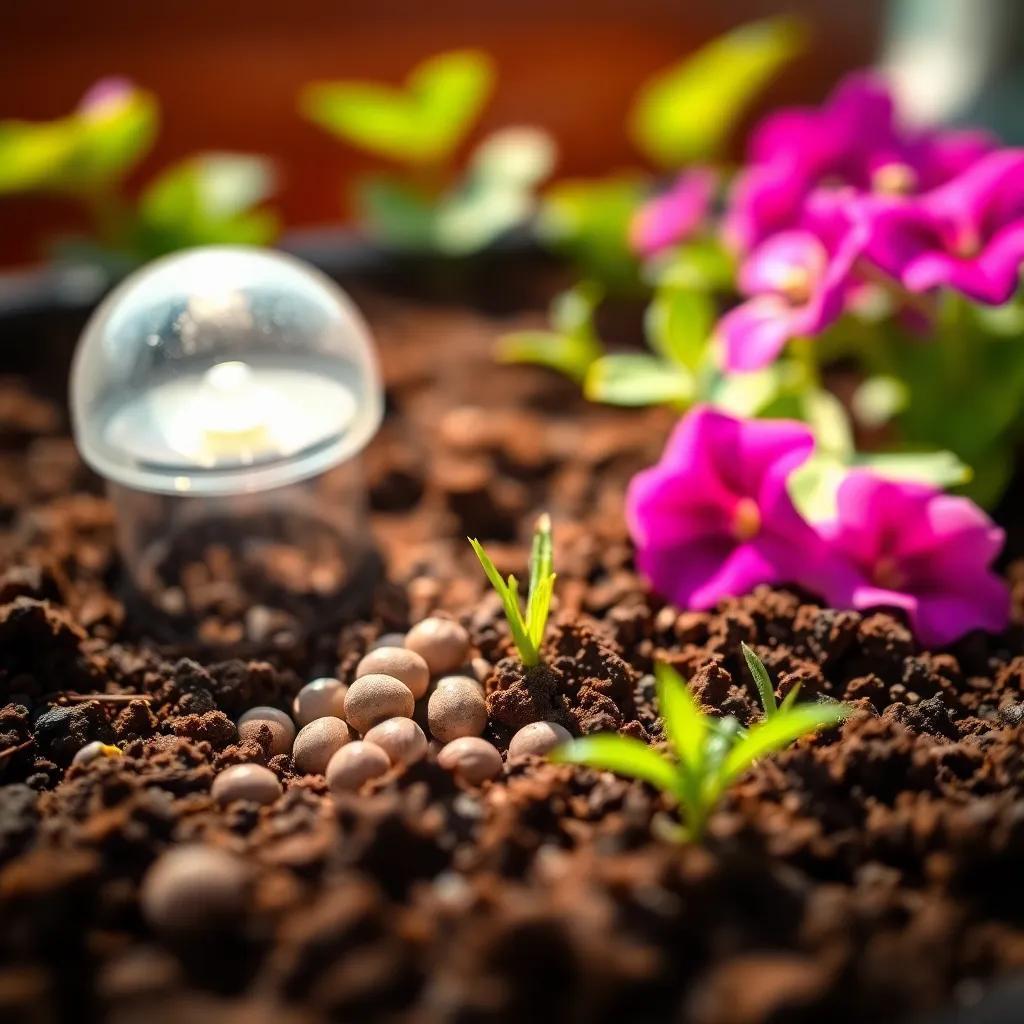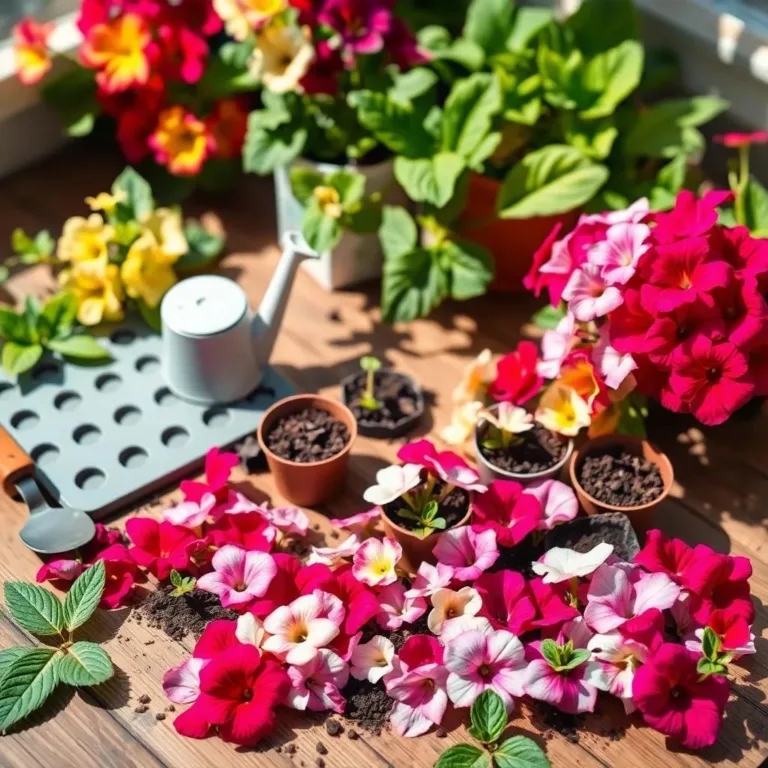Are you ready to sprinkle some joy into your garden? Growing petunias is not only fun, but it’s also a great way to fill your space with vibrant colors! In this article, I’ll share everything you need to know about getting those beautiful blooms from seeds to stunning flowers. Let’s dig in! 🌼
Factors Influencing Petunia Germination Time
When I think about growing petunias, I always consider the various factors that influence their germination time! Understanding these factors is like having a secret recipe for success in my gardening adventure. Here are some key players that can affect how fast those tiny seeds sprout:
- Seed Quality: Fresh seeds make a huge difference! If I grab some old or low-quality seeds, I might be waiting longer for them to germinate. I always check for reputable sources when purchasing seeds. Fresh seeds tend to sprout quickly and have a better chance of survival.
- Temperature: Petunias love warmth! The ideal temperature for germination is between 70°F and 75°F (21°C and 24°C). If it gets too cold, my seeds might just sit there, refusing to wake up! Placing my seed trays in a warm spot or using a heat mat helps create the cozy environment they crave.
- Moisture: Keeping the seeds moist (but not waterlogged) is vital. I always mist the soil regularly, ensuring that my seeds have enough moisture without drowning in it. Too much water can lead to mold, and that’s not the kind of growth I want!
- Light: Did you know that petunia seeds are light-sensitive? It’s true! I make sure to lightly press my seeds into the soil but never bury them too deep. Allowing some light to reach them can kickstart the germination process!
- Soil Quality: Good soil is like a cozy bed for my seeds! I always opt for well-draining mixes that hold moisture but don’t drown my little plants. Heavy or compacted soil can be a real bummer, so I make sure to choose wisely!
Each of these factors plays a significant role in determining how long it takes for my petunias to sprout. By keeping these in mind, I’m setting my garden up for a vibrant explosion of flowers!
Optimal Conditions for Successful Germination
Now that I know the key factors influencing petunia germination, let’s talk about creating the perfect environment for those seeds! Setting the right conditions is like giving my petunias a warm hug and saying, “Let’s grow!”
- Temperature: As I mentioned before, keeping the temperature in that sweet spot of 70°F to 75°F (21°C to 24°C) is essential. If I want to be a fancy gardener, I might invest in a seedling heat mat or simply find a warm sunny spot in my home.
- Moisture: I can’t stress enough how important it is to keep the soil moist! Before I even plant my seeds, I make sure the soil is evenly damp. During germination, I mist regularly to keep the moisture levels just right. Too dry, and my seeds will get cranky; too wet, and I risk rot!
- Light: Light equals life for petunias! I always try to give my seeds at least 12 to 14 hours of light each day. If I’m starting them indoors, a grow light or a sunny windowsill works wonders. Just remember to gently press the seeds into the soil to keep them in touch with the light!
- Air Circulation: Air is essential for my baby sprouts too! I avoid overcrowding my seeds and make sure they’re in a container with good airflow. If I use covers, I can remove them once the seeds start to sprout, allowing for proper air exchange.
- Germination Medium: Choosing the right medium is like picking the perfect cake mix! I love using a well-draining germination mix, like peat moss and perlite. This combo helps retain moisture while allowing excess water to escape.
Creating these ideal conditions can significantly speed up the germination process. With a cozy environment and a little patience, I’m on my way to a beautiful display of petunias in my garden! 🌸

Germination Times for Popular Petunia Varieties
When I’m selecting petunias for my garden, I often wonder how long it will take for each variety to sprout! Different types of petunias have unique germination times, and knowing these can help me plan my planting schedule. Here’s a breakdown of some popular petunia varieties and their typical germination times:
- Grandiflora Petunias: These beauties are known for their large flowers. They typically take about 7 to 10 days to germinate. I love using them to create a dramatic touch in my garden!
- Multiflora Petunias: If you’re looking for abundance, these are the way to go! They generally sprout faster, usually within 5 to 7 days. Their smaller blooms pack a colorful punch!
- Wave Petunias: Also known for their trailing nature, Wave petunias take a little longer with a germination time ranging from 10 to 14 days. They are perfect for cascading down containers!
- Cascading Petunias: Similar to Wave varieties, these are great for hanging baskets. They also take about 10 to 14 days to germinate. Once they bloom, they create a stunning display!
- Miniature Petunias: Often referred to as calibrachoa or million bells, these tiny wonders usually germinate within 5 to 7 days. They’re ideal for those compact garden spaces!
Knowing the germination times for these varieties helps me manage my expectations and plan accordingly. Remember, these times are just general guidelines; actual germination may vary based on conditions and seed quality. So, grab your seeds and get ready to enjoy a delightful garden!
Tips to Accelerate Petunia Seed Germination
Who doesn’t want to see their seeds sprout faster? Waiting for petunias to germinate can feel like watching paint dry! Luckily, there are several tips I’ve picked up over the years to speed up the germination process. Here’s what I’ve learned:
- Pre-Soaking Seeds: Soaking petunia seeds overnight can help them absorb moisture and soften their outer coating. This trick is like giving them a little jumpstart!
- Scarification: Some varieties have hard seed coats that can slow things down. A gentle scratch or nick with sandpaper can help break dormancy, speeding up germination.
- Provide Bottom Heat: If I use a seedling heat mat or place my seed trays on a warm surface, I can raise the temperature slightly. This warmth can encourage quicker seed sprouting in those chilly conditions!
- Use Grow Lights: For indoor planting, grow lights can provide the consistent light petunias need for strong growth. I keep them on for about 12 to 14 hours a day to create the best conditions.
- Keep the Medium Moist: Maintaining consistent moisture is key! I mist the soil regularly to help my seeds stay hydrated without drowning them.
- Choose Fresh Seeds: As mentioned before, fresh seeds usually have higher germination rates. So, when I’m at the store, I always check the date!
With these simple tips, I can help give my petunias the boost they need to sprout faster and grow strong. It’s all about creating the right environment and ensuring my seeds are ready to thrive!
Troubleshooting Common Germination Problems
Every gardener faces challenges now and then! Sometimes, my petunia seeds take longer to germinate than I expected, and frustrations bubble up! But don’t worry! Here’s how I troubleshoot common germination issues to keep my garden on track:
- Poor Germination Rates: If I notice few seeds sprouting, I first check the quality of my seeds. Old or low-quality seeds can lead to disappointing results! I also review my germination conditions—temperature, moisture, and light levels should match petunia needs.
- Uneven Germination: If some seeds sprout while others lag behind, it might be due to inconsistent moisture or temperature. I make sure to keep the soil evenly moist and maintain a stable temperature throughout the process.
- Slow Germination: If my seeds seem to be taking forever, I check my setup. Am I maintaining a temperature between 70°F and 75°F (21°C to 24°C)? Is the soil consistently moist? Sometimes, a little added heat or light can work wonders!
- Fungal Issues: Yikes! Overwatering can lead to fungal problems. I always keep an eye on my watering habits and ensure good air circulation. If I do notice signs of fungus, I remove affected seedlings immediately!
- Weak Seedlings: If my seedlings appear leggy or pale, it’s likely they’re not getting enough light. I adjust the lighting or rotate my seed trays to ensure they all get enough bright light.
By troubleshooting these common issues, I can keep my petunia seeds and seedlings happy and healthy. There’s nothing quite like the feeling of nurturing a plant from seed to bloom! 🌼

